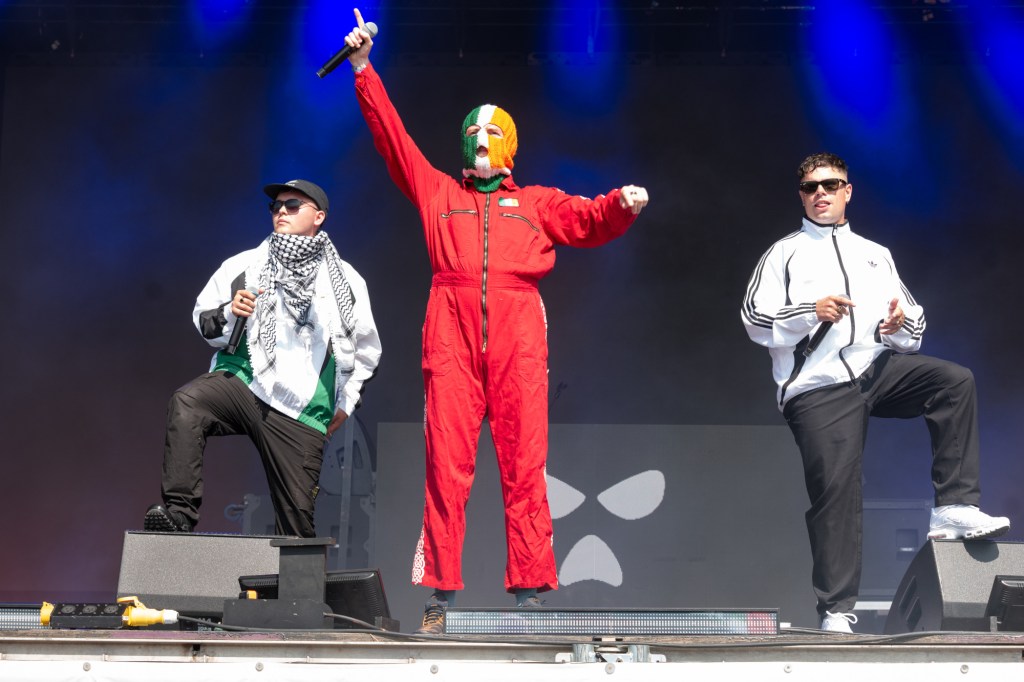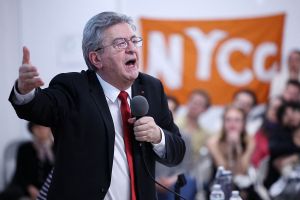So here’s the question I’ve been wrestling with since Bob Vylan chanted “Death, death to the IDF” at the Glastonbury music festival at the weekend. Is Bob Vylan a “he” or a “they?” I don’t mean a “they/them,” although that might be the case. I mean is Bob Vylan a person or a band? I keep seeing Bob Vylan referred to as “him,” including by the BBC, but a cursory Google search reveals that they are in fact a punk-rap duo, with neither performer actually named Bob. Is the band’s name supposed to be a play on Bob Dylan? And if they’re embracing the word “vylan,” presumably a synonym for “villain,” they can’t really complain about being prosecuted for their on-stage antics. They are self-proclaimed outlaws and to have this confirmed by the police and Britain’s Crown Prosecution Service will no doubt enhance their bad boy image, in much the same way that Kneecap, the Northern Irish republican band, are no doubt absolutely delighted that one of their members is being prosecuted under the 2000 Terrorism Act.
Should we indulge Bob Vylan in this way? My north star here is the Brandenburg Test, which was established in the 1969 US Supreme Court case of Brandenburg v. Ohio. This was a First Amendment challenge to the prosecution of a member of the Ku Klux Klan called Clarence Brandenburg for threatening the President, Congress and the Supreme Court with violent reprisals if they continued “to suppress the white Caucasian race.” The Supreme Court found for Brandenburg on the grounds that providing speech isn’t “directed to inciting or producing imminent lawless action and is likely to incite or produce such action” it is protected. It seems clear that calling for the death of the IDF, while clearly abhorrent, is not likely to produce imminent lawless action. Incidentally, the same applies to Lucy Connolly, the wife of a former Conservative councillor in Britain’s East Midlands and mother of one who was sentenced to 31 months in jail for a single tweet about burning down asylum hotels. Given that she didn’t name a particular hotel and added the caveat “for all I care,” her post wasn’t likely to incite imminent lawless action either.
Is it probable that Kneecap’s fans will riot when the lead singer goes on trial? Given that their fans are mainly middle-class soy boys who would run a mile from violent disorder, that seems unlikely
Nevertheless, could Bob Vylan be prosecuted under UK law, a question currently being considered by Avon and Somerset Police? One suggestion is they may be guilty of an offense under the Public Order Act 1986: intending to stir up racial hatred, which is what Lucy Connolly was prosecuted for. In their defense, Vylan could argue that the IDF is a military organization, not a racial group, and Lucy Connolly could have made a similar argument about asylum seekers if she had pleaded not guilty – they’re not a distinct racial group and therefore she wasn’t being “racist.” But, interestingly, Lady Hale ruled in 2007’s R v. Rogers that, for the purposes of deciding whether an offense is “racially aggravated,” the definition of “racial group” included “foreigners,” even if that group contains people of many different ethnicities. I think the prosecution in Lucy’s case would have argued that Lady Hale’s definition of “racial group” applies to the “stirring up” offense, not just to racially aggravated offenses, but it would be hard to run a similar argument in the prosecution of Bob Vylan.
While I think the punk-rap duo will probably escape prosecution, I’m not so confident about Kneecap. They, too, are being investigated by Avon and Somerset Police for their behavior at Glastonbury over the weekend. The incident in question was the band calling on their fans to riot outside Westminster Magistrates’ Court where the lead singer, Liam Óg Ó hAnnaidh, is due to go on trial for allegedly displaying the flag of Hezbollah, a proscribed terrorist organization. That could be another offense under the Public Order Act, namely inciting a riot. On the other hand, prosecuting a person for that offense requires the consent of the Attorney General, and Lord Hermer may withhold it.
What Kneecap said last week comes closer to failing the Brandenburg Test. They weren’t just inciting riot in general, but asking their fans to riot at a particular time and place. Under Brandenburg, inciting imminent lawless action isn’t sufficient; it has to be likely to take place as a result of the speech in question. Is it probable that Kneecap’s fans will riot outside Westminster Magistrates’ Court when the lead singer goes on trial? Given that their fans are mainly middle-class soy boys who would run a mile from violent disorder, that seems unlikely. And to be fair, the band did insist afterwards that they were “only joking.” Lucy Connolly deleted her unpleasant tweet and apologized for it, but the Attorney General, who also had to sign off on her prosecution, extended no such latitude to her.
Overall, my position is clear. Bob Vylan and Kneecap should not be prosecuted for their remarks at Glastonbury and Lucy Connolly should be given a pardon and set free. But to bang her up for over two-and-a-half years and do nothing about these posing pop stars does seem like another example of two-tier justice.

























